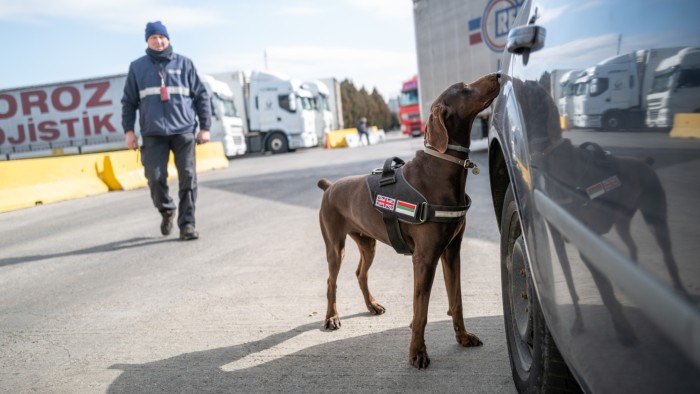Unlock the Editor’s Digest for free
Roula Khalaf, Editor of the FT, selects her favourite stories in this weekly newsletter.
It takes Adele the sniffer dog only a few seconds to find a tiny piece of rubber concealed in an old Ford saloon car parked up in the customs area of the Kapitan Adreevo crossing on Bulgaria’s border with Turkey.
The exercise being staged by Bulgaria’s border police is designed to demonstrate the effectiveness of a joint mission between the UK and Bulgaria to tackle the people-smuggling gangs making millions from ferrying irregular migrants across the English Channel.
The alliance is part of the UK’s wider mission to bolster partnerships with EU member states, particularly on immigration and national security grounds.
In recent months, British Prime Minister Sir Keir Starmer has made joint statements on irregular migration with Italy and Germany.
The UK has also called for migration to be one of four areas to be discussed at the forthcoming EU-UK reset summit on May 19, according to two senior EU officials.
The increased focus on Bulgaria comes after the country became a full member of the EU’s Schengen borderless travel zone on January 1. This has made the country’s border with Turkey a key target for illegal people traffickers seeking to reach European countries.
“It has been noticed that on the issue of irregular migration, the British government has become much more proactive,” one of the EU officials added. “We can see the UK is working not just to ‘stop the boats’ at Calais but taking an end-to-end approach to this issue.”
Pressure on the Bulgarian-Turkish frontier has been growing. There was a 38 per cent increase in interceptions of irregular migrants in 2024 — up from 1,452 people in 2023 to 2,012 last year, according to data from the Bulgarian border force.
UK ministers say the international agreement first signed in November 2023 with Bulgaria by the previous Conservative government is expected to take on renewed urgency this year.
Border security minister Dame Angela Eagle told the Financial Times the UK was working to “deepen our operational co-operation” with Sofia as part of government plans aimed at “strengthening border security, reducing organised immigration crime and preventing loss of life”.
Bulgaria, with the help of EU authorities, is also stepping up its border operations, working closely with its neighbouring countries along with other EU states.
“Since entering Schengen there has been a special police operation, including police from Bulgaria, Hungary, Austria and Romania to prioritise the combating of illegal migration on the border,” said chief inspector Yani Peychev, head of the Kapitan Adreevo border control post.
Irregular migrants that manage to cross into Bulgaria along the 271km border with Turkey can then travel through the EU to the northern coast of France and onward to Britain, although several Schengen countries such as Germany and Austria have reintroduced temporary border checks to curb irregular movements across the continent.
The UK’s contribution to that effort is symbolised by the Bulgarian and Union flags on the harness of the dog that was trained by the UK’s National Crime Agency to sniff out the kind of rubber used to make the cheap dinghies that are constructed in illegal factories in Turkey.


Over the past 18 months, the NCA reports that Adele and her Bulgarian handlers have helped seize more than 125 unseaworthy boats, 128 outboard engines, more than 700 pumps and 300 rubber rings as part of efforts to squeeze the supply chains of the people smuggling industry.
Filip Nikolov, head of customs, said it was a constant battle to stay ahead of the criminal gangs. The latest case involved a consignment of boats marked as children’s paddling pools.
“The smugglers are trying new strategies to escape detection, and after the X-ray of the truck they looked like pools, but we still found them,” he said. Another consignment of outboard motors was found this month hidden in the luggage compartment of a coach load of holidaymakers.


The Kapitan Andreevo crossing, which processes over 1mn trucks a year, also boasts scanners and carbon-dioxide detection systems to seek out stowaways that show up on X-rays screens as ghostly figures, crouched over crates of tomatoes or hidden under false floors in passenger vehicles.
Overall irregular migrant detections in the EU fell by 38 per cent to 239,000 last year, according to data from Frontex, the EU’s border agency — however the number of detections of attempted crossings to the UK rose by 9 per cent over the same period.
There is no data on the numbers of boats and motors that escaped detection by the authorities, but UK embassy officials pointed to “market indications” that the efforts to crimp the smugglers’ supply-lines were having an impact.
Data from independent investigators who have interviewed criminal gangs shows the price of irregular Channel crossings fluctuating according to pressures exerted by border controls.
“There are indicators that the journey across the Channel has become considerably difficult and expensive since the intensification of UK co-operation with European partners, including Bulgaria on the EU’s external frontier,” the UK embassy official added.


Soon after being elected last July, Starmer used a speech at the European Political Community summit hosted by the UK to announce the UK was “resetting” its approach to irregular migration.
Starmer abandoned a Conservative plan to process irregular migrants in the east African state of Rwanda, saying the UK would instead commit to “practical solutions that are in line with international law”, including an increased UK presence at Europol in The Hague.
“We are going to work with our European partners to share intelligence, data and expertise and put the gangs out of business,” he added.
Data visualisation by Amy Borrett; additional reporting Laura Dubois in Brussels.






